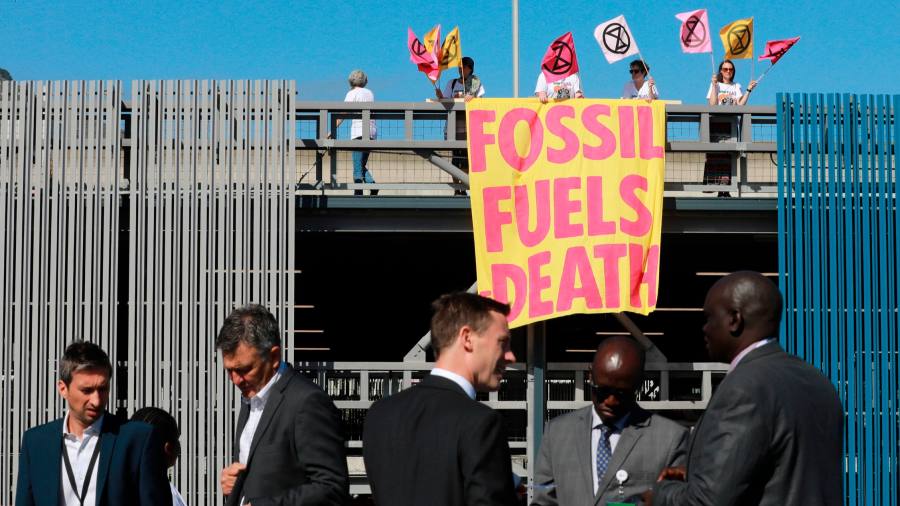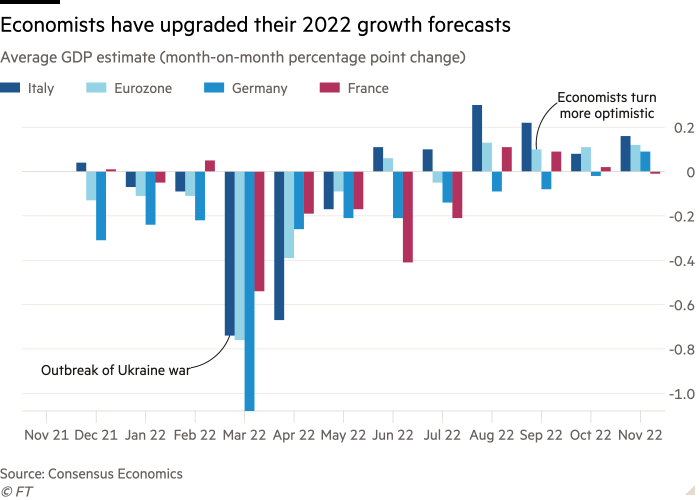
This article is an on-site version of our Europe Express newsletter. Sign up here to get the newsletter sent straight to your inbox every weekday and Saturday morning
Good morning and welcome to Europe Express.
The European Commission’s efforts to push the EU’s ambitious green agenda at international level took a hit at the UN climate conference in Egypt and are likely to suffer another blow this week over an international treaty designed to protect energy investments. We’ll unpack the stakes in Energy Charter Treaty reform and why so many capitals are throwing in the towel.
Over the weekend, UK Prime Minister Rishi Sunak went on a surprise trip to Kyiv to show support and promise more aid for Ukraine in defending itself against Russia. We’ll bring you up to speed with what was agreed.
Upon his return, Sunak was warned by senior Eurosceptics not to pursue a Swiss-style trading relationship with the EU — which Brussels has absolutely no intention of replicating in any case. Plus ça change . . .
Treaty fights
The EU put three years and 15 rounds of negotiations into modernising a controversial treaty but member states are jumping ship and refusing to back the overhaul that was due for approval tomorrow, writes Alice Hancock in Brussels.
The Energy Charter Treaty was established in 1991 and was designed to protect western fossil fuel companies from arbitrary government decisions in the fledgling eastern European democracies that had just emerged from decades of communism.
Now, several countries, notably France, Germany and Spain, say the treaty is outdated and irreconcilable with their climate laws as it protects fossil fuel investors. Eight countries have announced in recent weeks they want to exit the ECT, even though the commission has been working on amendments that nullify the protection for fossil fuel companies.
The conflict came to a head in a late-night meeting on Friday.
Ambassadors from France, Germany, Spain and the Netherlands said they would abstain from approving the updated text, leaving the commission without a mandate to ratify the agreement tomorrow, when the treaty’s 53 signatories are due to meet. (Other major ECT signatories include Japan, the UK, Switzerland and Kazakhstan.)
Austria said on Saturday it was considering joining the eight refuseniks. “There are many fundamental criticisms of the Energy Charter Treaty, and this applies all the more after the failure of modernisation. It now continues to protect investments in fossil oil and gas. This limits our ability to act in the fight against the climate crisis,” Austrian climate minister Leonore Gewessler said.
The commission said it “noted” member states did not agree on the ECT and will request a delay to the November 22 vote. “The EU will have to reflect on this,” one EU diplomat said.
ECT critics point to the numerous cases that investors in both fossil fuel and renewable energy assets have brought against governments over policy changes, as lawmakers update regulations in line with the transition to cleaner fuels.
Several high-profile cases such as the one between the UK oil and gas exploration company Rockhopper and the Italian government have resulted in payouts of hundreds of millions of euros to investors. The arbitration of such cases, which is often opaque and paid for by the parties involved, has also been widely criticised.
“The only viable solution is an EU exit from the Energy Charter Treaty and an invitation to [other] parties . . . to withdraw,” said Cornelia Maarfield, trade policy expert at Climate Action Network Europe.
The problem with quitting the ECT, however, is that even once a country is out, the treaty still applies for another 20 years — a provision that remains even in the commission’s proposed reform. And given that at least three-quarters of signatories must ratify the modernisation proposal for it to be adopted, it is hard to see how the commission’s efforts will succeed.
Chart du jour: Silver linings

The likelihood that the eurozone will fall into a deep recession this winter is receding, as greater fiscal support from governments, lower gas prices and a mild autumn help to improve the bloc’s outlook.
Sunak in Ukraine
The UK’s Prime Minister Rishi Sunak made a surprise visit to Ukraine over the weekend, pledging more military and civilian aid in the country’s defence against Russian aggression, writes Christopher Miller in Kyiv.
Moscow rained down some 150 missile strikes on Ukraine’s critical infrastructure last week alone, according to Kyiv, leaving approximately 10mn people without power.
Sunak announced a £50mn package of defence aid comprising 125 anti-aircraft guns and technology to counter deadly Iranian-supplied drones, including dozens of radars and anti-drone electronic warfare capability. It follows more than 1,000 new anti-air missiles announced by the UK government earlier this month.
“Since the first days of the war, Ukraine and the UK have been the strongest of allies,” President Volodymyr Zelenskyy said on Telegram.
The UK is sending tens of thousands of extreme-cold winter kits for Ukrainian troops and will fund the repair of six bridges and the construction of two housing projects for internally displaced people, including a development in Bucha for some 2,250 residents, the UK government stated.
A total of £16mn will flow from London to international organisations that help provide generators, shelter, water supply repairs and mobile health clinics to Ukraine, the statement added.
In addition to meeting Zelenskyy, Sunak also talked to first responders at a fire station about their work rescuing survivors from the rubble and fighting fires in the aftermath of Russian air strikes and mortar attacks. Sunak said it was “deeply humbling” to have met “those who are doing so much, and paying so high a price, to defend the principles of sovereignty and democracy”.
What to watch today
-
Agriculture ministers meet in Brussels
-
EU foreign policy chief Josep Borrell receives Serbia’s Aleksandar Vučić and Kosovo’s Albin Kurti for talks in Brussels
-
European parliament meets in Strasbourg for the week
. . . and later this week
-
EU home affairs ministers meet in Brussels on Friday for an emergency council on migration
-
MEPs on Wednesday will vote on a resolution declaring Russia a state sponsor of terrorism
-
EU energy ministers discuss the gas price cap on Thursday
Notable, Quotable
-
Go west: The combination of the US administration’s subsidy package and high energy costs in Europe is sounding alarm bells in EU capitals as it has the potential to prompt an exodus of companies to the other side of the Atlantic.
-
Worrying trend: For several weeks every Monday evening antiwar rallies have taken place in dozens of towns and cities across eastern Germany, pointing to a worrying trend for Europe’s political mainstream.
Recommended newsletters for you
Britain after Brexit — Keep up to date with the latest developments as the UK economy adjusts to life outside the EU. Sign up here
Trade Secrets — A must-read on the changing face of international trade and globalisation. Sign up here
Are you enjoying Europe Express? Sign up here to have it delivered straight to your inbox every workday at 7am CET and on Saturdays at noon CET. Do tell us what you think, we love to hear from you: [email protected]. Keep up with the latest European stories @FT Europe